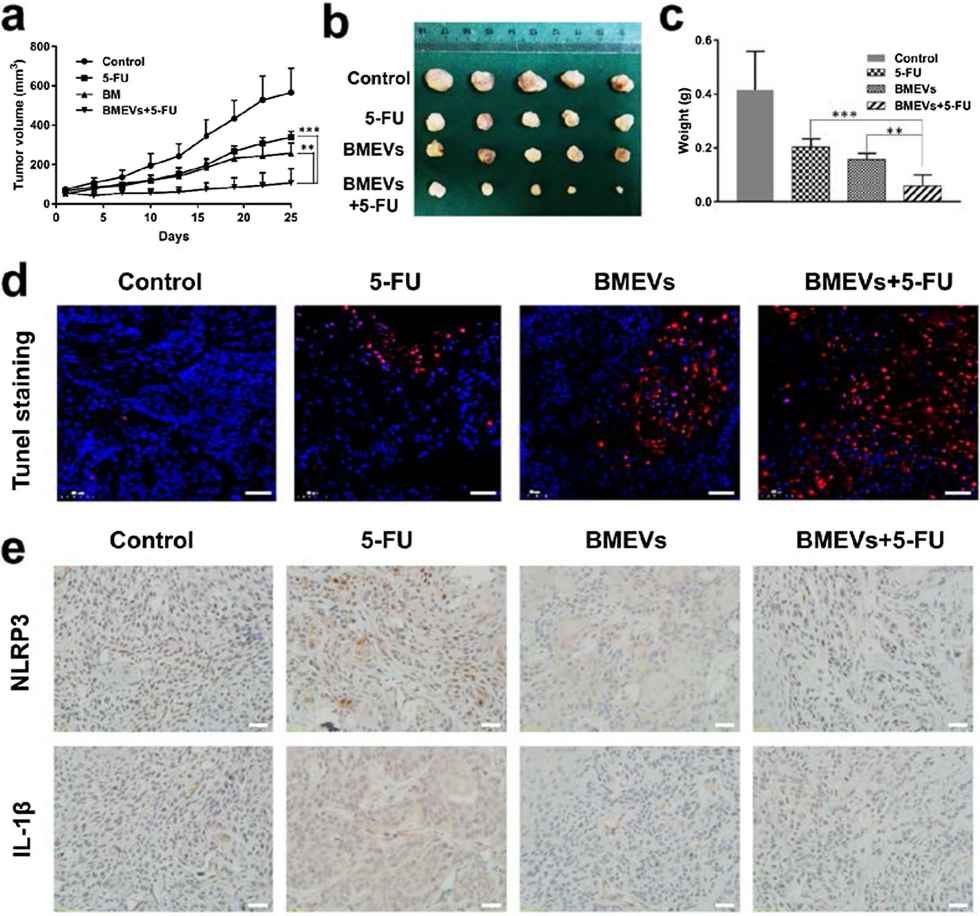Bitter Melon-derived Exosome Research and Application
Bitter melon, renowned for its unique bitterness and outstanding medicinal value, has garnered significant attention in the biomedical field as a natural choice for the treatment and prevention of various diseases. Creative Biolabs supports the research of bitter melon-derived exosomes, which may carry a rich payload of pharmacologically active biomolecules, and is committed to facilitating bitter melon-derived exosome studies.
 Fig.1 Bitter melon-derived exosome enhanced the cytotoxic effect of 5-FU in vivo.1,2
Fig.1 Bitter melon-derived exosome enhanced the cytotoxic effect of 5-FU in vivo.1,2
Bitter Melon: Nature's Medicine and Nutrient Storehouse
-
Blood Glucose Regulation: Bitter melon is well-known in biomedicine for its blood glucose-lowering effects. It contains a unique amino acid sequence known as mcIRBP-19, which can reduce blood glucose levels. Research indicates that mcIRBP-19 from bitter melon extracts can bind to insulin receptors, stimulate downstream insulin signaling pathways, increase glucose uptake, and help regulate blood glucose levels in diabetic patients.
-
Obesity and Lipid Regulation: Obesity is a major risk factor for chronic diseases, including hypertension, hyperlipidemia, and cardiovascular diseases. Bioactive components in bitter melon can impact fat synthesis and glucose metabolism, aiding in obesity prevention. This includes stimulating glucose transporter expression, enhancing glucose uptake, and increasing fatty acid oxidation, contributing to weight control and reduced lipid levels.
-
Anticancer Effects: Bitter melon extracts have been studied as adjuvants in cancer therapy. They contain various bioactive compounds that can inhibit tumor cell proliferation, induce apoptosis (cell death), and affect multiple molecular mechanisms, including the modulation of apoptosis-related proteins, inhibition of tumor angiogenesis, and regulation of cell signaling pathways.
-
Antioxidant and Immune Modulation: Bitter melon is rich in antioxidants, which combat free radical damage and reduce oxidative stress. Additionally, it can enhance immune system function, improving resistance to infections and diseases.
Research on Bitter Melon-Derived Exosomes
|
Extraction Method
|
Target
|
Possible Mechanism
|
|
Electrophoresis-Combined Dialysis
|
Oral Squamous Cell Carcinoma
|
Bitter melon-derived exosomes enhance the therapeutic effects of 5-fluorouracil (5-FU) against oral squamous cell carcinoma by suppressing the NLRP3 pathway, regulating ROS production, and reducing drug resistance.
|
|
Ultracentrifugation and Sucrose Gradient Purification
|
Neurons
|
Bitter melon-derived exosomes improve outcomes in ischemia-reperfusion-induced brain injury by mitigating blood-brain barrier disruption, inhibiting matrix metalloproteinase 9 expression, activating the AKT/GSK3β pathway, and reducing neuronal apoptosis.
|
|
Ultracentrifugation
|
Cardiomyocytes
|
Bitter melon-derived exosomes protect cardiomyocytes from radiation injury by reducing DNA damage, improving mitochondrial function, and restoring ROS-related protein phosphorylation levels.
|
|
Ultracentrifugation
|
Breast Cancer Cells
|
Bitter melon-derived exosomes exhibit significant anticancer effects by promoting reactive oxygen species (ROS) production and disrupting mitochondrial function in breast cancer cells, showing potential in tumor therapy.
|
|
Ultracentrifugation
|
Colon Ulcers
|
Bitter melon-derived exosomes play a crucial role in ulcerative colitis recovery by modulating oxidative and inflammatory factors, showcasing remarkable antioxidant activity.
|
In summary, bitter melon-derived exosomes hold extensive application potential. However, further in-depth research and exploration are required. In this field, Creative Biolabs has successfully established the plant exosome development platform, providing essential technical support for future applications of bitter melon-derived exosomes. If you are enthusiastic about this exciting field and seek more information or collaboration opportunities, please feel free to contact us.
Plant-Derived Exosome Isolation
Plant-Derived Exosome Identification
High-Throughput Screening Analysis (Proteins, RNA, Lipids and Metabolites)
Large-Scale Production of Plant-Derived Exosomes
References
-
Yang, M.; et al. Bitter melon derived extracellular vesicles enhance the therapeutic effects and reduce the drug resistance of 5-fluorouracil on oral squamous cell carcinoma. Journal of Nanobiotechnology. 2021, 19(1):259.
-
under Open Access license CC BY 4.0, without modification.
For Research Use Only. Cannot be used by patients.
Related Services:

 Fig.1 Bitter melon-derived exosome enhanced the cytotoxic effect of 5-FU in vivo.1,2
Fig.1 Bitter melon-derived exosome enhanced the cytotoxic effect of 5-FU in vivo.1,2









